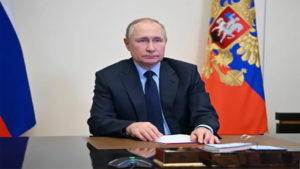 Russia has published a list of 43 “unfriendly countries” which face new economic restrictions in retaliation for sweeping sanctions brought in by the West.
Russia has published a list of 43 “unfriendly countries” which face new economic restrictions in retaliation for sweeping sanctions brought in by the West.
Vladimir Putin’s forces have been trying to gain control over Ukraine for 13 days, but run into a number of logistical problems and a stronger resistance than they initially expected.
Sanctions have also been imposed by the UK, US, Canada and the EU, causing the Russian ruble to drop to its lowest ever value.
These have included sweeping measures against Putin himself, his ministers, oligarchs, individuals close to the Kremlin, banks, and key businesses.
Under the new restrictions being brought in by the Kremlin, financial trades, loans, and real estate purchases will need “special authorisation” if nations from the list are involved.
The list includes;
United States
Canada
the EU states
UK (including Jersey
Anguilla
British Virgin Islands
Gibraltar
Ukraine
Montenegro
Switzerland
Albania
Andorra
Iceland
Liechtenstein
Monaco
Norway
San Marino
North Macedonia
Japan
South Korea
Australia
Micronesia
New Zealand
Singapore
Taiwan (considered a territory of China, but ruled by its own administration since 1949)
Taiwan was an interesting addition to the list, as China – a key ally of Russia – does not recognise it as a separate country but rather part of its own borders.
China has refused to condemn Russia’s actions and refused to call Putin’s actions an “invasion”, instead asking Western nations to respect Russia’s “legitimate security concerns”.
It has called for a solution to the crisis through peaceful negotiations.
Taiwan’s foreign minister Joseph Wu said Russia’s decision to put Taiwan on the list would have little effect on their bilateral relations.
During a visit to London on Monday, Canadian prime minister Justin Trudeau announced new sanctions against 10 individuals who were “complicit in this unjustified invasion.”
Russia’s economy has come under immense pressure from the international sanctions, with the rouble weakening to 133.5 to the dollar – a 40% drop in value compared to before the invasion.
Russian state media has portrayed the measures as a retaliation to the sanctions brought in, which have almost entirely cut the Russian people from international payment systems.
A number of credit card companies have also pulled out of Russia, including Visa, Mastercard and American Express.
The list follows a presidential decree on 5 March allowing the Russian government, companies and citizens to temporarily pay foreign currency debts owed to overseas creditors from “unfriendly countries” in rubles.
To make such payments, the government said debtors should open a special type of ruble account with a Russian bank and transfer into it the ruble equivalent of the foreign currency amount owed according to the central bank’s official exchange rate on the day of payment.
The Russian economy could come under further pressures following reports US President Joe Biden is set to announce a ban on Russian oil and other energy imports.
Biden has been working with allies in Europe, who are far more dependent on Russian oil, to isolate Russia’s energy-heavy economy and Putin.
Two people familiar with the matter told Reuters on Monday the United States may move ahead with a ban on Russian oil imports without the participation of allies in Europe.
The UK is reportedly set to join the US in the ban, and will ban the import of Russian oil gradually.
It comes after Ukrainian president Volodymyr Zelenskyy issued a plea for the West to stop buying Russian oil, which has so far escaped sanctions.
Oil prices climbed back above $130 a barrel as reports of the latest sanctions emerged.
